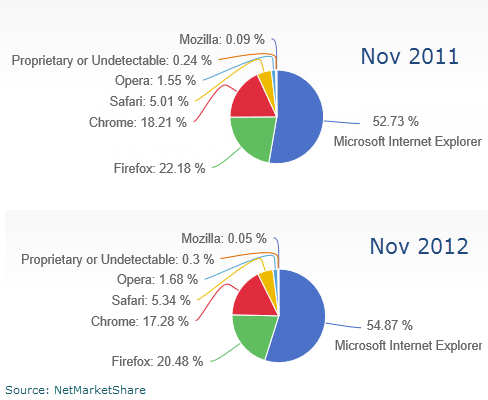The browser wars seem to have settled into an uneasy truce

I used to pay really close attention to measurements of desktop browser usage share. Between 2004 and 2010 I did regular updates using stats from my personal site. Over the past couple years I have done the same thing here using data from Net Market Share, which publishes snapshots of web usage based on data from 160 million visits per month to its network (the exact methodology is here).
When I heard that this month's numbers were available, it dawned on me that I hadn't looked carefully at browser shares in well over a year. After reviewing this month's data and looking back at 18 months' worth of trends, I understand why.
The browser wars are over, at least on the desktop.
Want proof? Look at the Net Market Share numbers from November of this year and the corresponding period last year.

Microsoft's Internet Explorer garnered 54.87% of web usage worldwide last month. That's up from 52.73% a year ago, and it's an improvement over the June 2011 figure of 53.7%.
Meanwhile, Firefox and Chrome are both down in usage from a year ago at this time, with Mozilla's share sliding nearly 2 percentage points to 20.48% and Google dropping nearly 1 point to 17.28%.
Safari and Opera are both up incrementally.
The patterns one can see in the data match what I see anecdotally.
Microsoft has fixed most of what once made Internet Explorer so awful, with massive improvements in both performance and security. Back in June of 2011 I called IE "the biggest loser" and noted that on the Net Market Share scale, "IE is in danger of slipping below the 50% mark." It looks like that's not going to happen. Those who quit using IE are unlikely to return, but the exodus seems to have stopped.
Firefox was the default choice for years of people who wanted to avoid IE-related security issues or wanted more customizability. But being the anti-IE turned into a liability when Google came in with a newer, faster alternative to Internet Explorer.
Here's what I wrote a year and a half ago:
Over the years, [Firefox] has defined itself as the safe alternative to Internet Explorer, and it had that slot all to itself while Microsoft was cleaning up its Vista mess. But now it’s been replaced in that role by Chrome, which has the full weight of Google behind it. Given that Google has been Mozilla’s chief backer through the years, it’s hard to see a bright future for Firefox.
I don't see anything coming out of Mozilla these days that will improve its prospects on the desktop.
And finally there's Google. After years of meteoric growth, Chrome seems to have stalled, hitting its peak sometime last year. In my experience, it's successfully carved out an identity as "the browser people use when they use lots of other Google services." Google is making a concerted effort to push Chrome and its Google search app to Windows 8 users. It will be interesting to check those numbers in a year or so, with more than 100 million Windows 8 users.
Most gratifying of all was seeing the share of Internet Explorer 6 at a mere 6.51%, with IE7 even lower than that at 2.26%. Together those two horribly outdated browsers make up less than 9% of all web traffic. A year from now that number should drop by more than half (although in a perfect world it would drop to zero).
Conventional PCs continue to sell hundreds of millions of units a year, and people continue using them to access online information. So these numbers are still meaningful to a very large economy.
But the battleground has shifted. A great deal of web traffic has migrated to mobile devices, which use completely different browsers. And it's also true that a lot of that mobile traffic has moved off the web and into apps.
Collectively, on mobile devices, Safari and Google's Android Browser account for more than 88% of all mobile/tablet browser share. The good news for Microsoft is that Internet Explorer's share on those mobile devices and tablets has doubled in the past year. The bad news is that in November 2012 its share was still below 1% (0.96%, to be precise).
If you're trying to understand why Microsoft is so focused on mobile users in Windows 8, there's your answer.